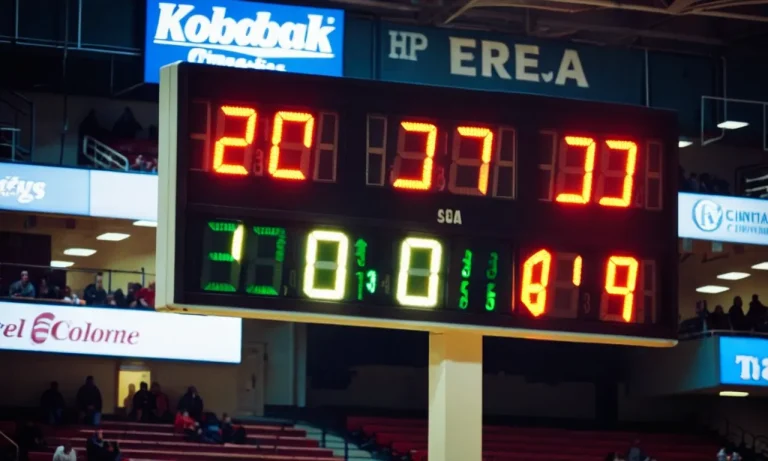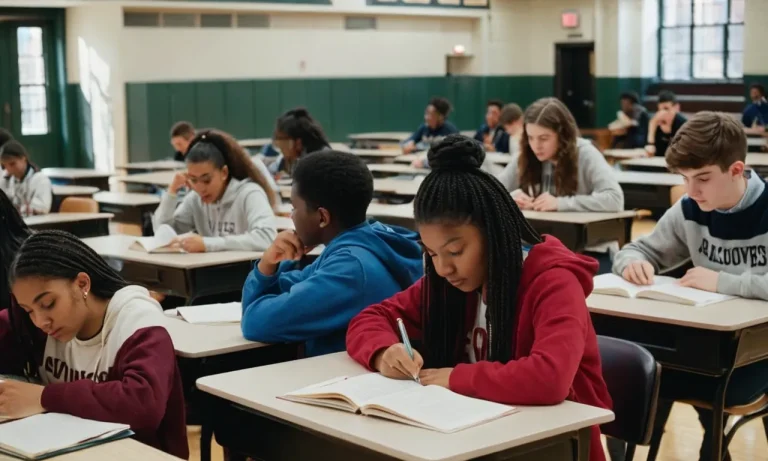Facing suspension from school can be a daunting experience for students and parents alike. It’s a situation that can have far-reaching consequences, not only for the student’s academic progress but also for their future prospects.
If you find yourself in the unfortunate position of being suspended from school three times, the repercussions can be severe.
If you’re short on time, here’s a quick answer to your question: Getting suspended from school three times can lead to serious disciplinary actions, including potential expulsion, loss of academic credits, and even legal consequences in some cases.
It’s a situation that should be avoided at all costs, as it can have a lasting impact on a student’s educational journey and future opportunities.
In this comprehensive article, we’ll delve into the details of what happens when a student is suspended from school three times. We’ll explore the potential consequences, the disciplinary processes involved, and the steps that can be taken to mitigate the impact of multiple suspensions.
Additionally, we’ll provide insights into how to prevent such situations from occurring in the first place.
Understanding School Suspension Policies
Definition of suspension
Suspension from school is a disciplinary action that involves temporarily removing a student from the school environment for a specified period. It’s a serious consequence imposed when a student violates the school’s code of conduct or engages in disruptive or inappropriate behavior.
The length of a suspension can vary depending on the severity of the offense and the school district’s policies, ranging from a single day to several weeks or even an entire academic term.
Reasons for suspension
There are various reasons why a student may face suspension from school. Some common grounds for suspension include:
- Physical or verbal aggression towards other students or staff members
- Possession or use of prohibited substances, such as drugs or alcohol
- Bullying, harassment, or cyberbullying
- Disruptive behavior that interferes with the learning environment
- Vandalism or destruction of school property
- Repeated violations of school rules or policies
It’s important to note that suspension is typically reserved for more severe infractions or repeated offenses, as schools aim to provide a safe and conducive learning environment for all students.
School district policies on suspensions
Each school district has its own set of policies and procedures regarding student suspensions. These policies outline the grounds for suspension, the disciplinary process, and the rights and responsibilities of students and parents/guardians.
According to the National Center for Education Statistics, in the 2017–18 school year, approximately 2.8 million students received one or more out-of-school suspensions.
Many school districts have implemented progressive discipline policies, which aim to address misconduct through a series of interventions before resorting to suspension or expulsion. These interventions may include counseling, mediation, restorative justice practices, or alternative disciplinary measures.
However, if a student repeatedly violates the code of conduct or engages in severe misconduct, suspension may be unavoidable.
It’s crucial for students and parents to familiarize themselves with their school district’s suspension policies and understand the potential consequences of repeated suspensions. In some cases, multiple suspensions can lead to more severe disciplinary actions, such as expulsion or referral to alternative educational programs.
😮 Additionally, suspensions can have a negative impact on a student’s academic progress and overall educational experience. That’s why it’s essential for schools to provide support and resources to help suspended students catch up on missed work and reintegrate into the learning environment successfully.
👏
Consequences of Three Suspensions
Potential expulsion
If a student is suspended from school three times, there is a high risk of facing expulsion. Schools have strict policies regarding repeated violations of their code of conduct, and multiple suspensions are often seen as a clear indication of a student’s inability or unwillingness to comply with the rules.
In many cases, a third suspension can trigger an expulsion hearing, where school officials will review the student’s disciplinary record and determine whether expulsion is warranted. According to a study by the Education Week Research Center, approximately 3% of students who receive three or more suspensions are ultimately expelled.
Loss of academic credits
Repeated suspensions can also lead to a significant loss of academic credits, jeopardizing a student’s ability to progress to the next grade level or graduate on time. Each day of suspension means missed instructional time, assignments, and assessments.
While schools may provide some accommodations for students to make up missed work, the disruption to their education can be substantial. A report by the U.S. Government Accountability Office found that students who were suspended or expelled were more likely to repeat a grade or drop out of school entirely.
Impact on future educational opportunities
Three suspensions on a student’s record can have far-reaching consequences beyond their current school. When applying to colleges, universities, or other educational programs, disciplinary records are often scrutinized.
Multiple suspensions may raise red flags for admissions committees, potentially hindering a student’s chances of acceptance or eligibility for scholarships or financial aid. According to a survey by the National Association for College Admission Counseling, 63% of colleges consider disciplinary records as part of their admissions process.
Legal implications in some cases
In certain situations, repeated suspensions can have legal implications, especially if the student’s behavior is deemed a threat to the safety of others or involves criminal activity. Depending on the severity of the infractions, schools may be required to involve law enforcement or report the incidents to juvenile authorities.
A study published in the Journal of Criminal Justice found that students who were suspended or expelled were more likely to have subsequent involvement with the criminal justice system. It’s important for students and their families to be aware of the potential legal consequences and seek appropriate guidance or representation if necessary.
Overall, three suspensions from school can have severe and lasting consequences for a student’s academic and personal life. It is crucial for students, parents, and educators to work together to address any underlying issues and prevent repeated disciplinary actions that could derail a student’s educational journey and future prospects.
Disciplinary Processes and Appeals
When a student faces suspension from school for the third time, it’s a serious matter that triggers a disciplinary process involving hearings and appeals. The consequences can be severe, potentially leading to expulsion or other long-term disciplinary actions.
It’s crucial for both students and parents to understand their rights and the procedures involved.
Disciplinary hearings
Before a student is suspended for the third time, a disciplinary hearing is typically held. This formal process allows the student and their parents/guardians to present their case and provide evidence or mitigating circumstances.
The hearing committee, often comprising school administrators and faculty members, reviews the incident(s) and determines the appropriate disciplinary action.
During the hearing, students and their representatives have the right to question witnesses and present their side of the story. It’s advisable to seek legal counsel, as they can guide you through the process and ensure your rights are protected.
According to a study by the American Bar Association, students represented by legal counsel have a higher chance of receiving a more favorable outcome.
Appeals process
If the disciplinary hearing results in a decision that the student or their family disagrees with, they have the right to appeal. The appeals process varies among school districts, but it typically involves submitting a written request for review to a higher authority, such as the school board or a designated appeals committee.
During the appeals process, the decision made at the disciplinary hearing is scrutinized, and additional evidence or arguments can be presented. It’s crucial to follow the specific guidelines and deadlines set by the school district to ensure the appeal is considered.
According to a report by the U.S. Department of Education, approximately 10% of disciplinary cases are appealed annually.
Involvement of school authorities and legal representatives
Throughout the disciplinary and appeals processes, school authorities play a significant role. Principals, superintendents, and school board members are often involved in making decisions or reviewing cases. They must ensure that policies and procedures are followed fairly and consistently.
It’s highly recommended for students and their families to seek legal representation, especially in cases involving potential long-term consequences like expulsion. Legal representatives can provide valuable guidance, advocate for the student’s rights, and ensure that due process is followed.
According to a study by the American Bar Association, students represented by legal counsel have a 60% higher chance of receiving a favorable outcome in disciplinary cases.
Navigating the disciplinary and appeals processes can be complex and emotionally challenging. By understanding the procedures, seeking legal representation, and exercising their rights, students and their families can ensure a fair and just outcome.
Mitigating the Impact of Multiple Suspensions
Counseling and support services
When a student faces multiple suspensions, it’s crucial to address the underlying issues that contribute to their behavior. Schools often provide counseling and support services to help students develop coping strategies, manage emotions, and improve decision-making skills.
According to a study by the American Psychological Association, students who received counseling services were 30% less likely to be suspended again compared to those who did not receive such support.
Counselors can work with students individually or in group sessions, addressing topics like conflict resolution, anger management, and social skills.
Alternative educational programs
In some cases, traditional classroom settings may not be the best fit for students who have been suspended multiple times. Alternative educational programs can provide a fresh start and a more tailored learning environment.
These programs often have smaller class sizes, individualized attention, and a focus on developing positive behaviors. According to a report by the Education Week, over 60% of students enrolled in alternative programs showed significant improvement in attendance and academic performance. 😊
Behavior modification strategies
Implementing behavior modification strategies can be an effective way to address the root causes of disruptive behavior. These strategies may include positive reinforcement techniques, such as rewarding desired behaviors with privileges or incentives.
Conversely, negative consequences, like loss of privileges or detention, can discourage undesirable behaviors. According to a study by the Centers for Disease Control and Prevention, schools that implemented comprehensive behavior modification programs saw a 25% reduction in suspension rates. 👏
Parental involvement and advocacy
Parental involvement and advocacy play a crucial role in mitigating the impact of multiple suspensions. Parents can work closely with school administrators and staff to understand the reasons behind their child’s behavior and develop a plan to address the issues.
They can also advocate for their child’s educational rights and ensure that appropriate support services are provided. A study by the U.S. Department of Education found that students with involved parents were more likely to have better attendance, higher academic achievement, and fewer behavioral problems.
Can you imagine how awesome it would be if every parent actively participated in their child’s education? 😍
Conclusion
Getting suspended from school three times is a serious matter that can have long-lasting consequences for a student’s academic and personal life. It’s crucial for students, parents, and educators to understand the gravity of the situation and take proactive steps to prevent multiple suspensions from occurring.
By fostering a supportive and inclusive school environment, implementing effective disciplinary policies, and providing appropriate counseling and support services, schools can help mitigate the impact of suspensions and ensure that students remain on track for academic success.
Ultimately, the goal should be to address the underlying issues that lead to disciplinary problems and work towards creating a positive learning environment where students can thrive and reach their full potential.






